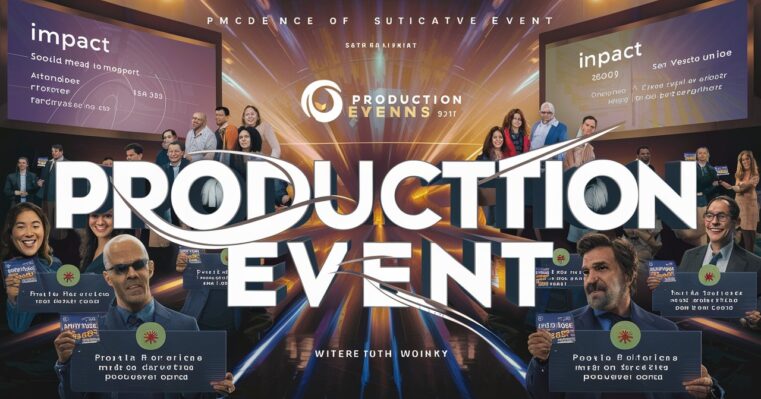Are you looking to host a production event but unsure where to start? Look no further! In this article, we will dive into the world of production events, covering everything from how to plan and execute them, to examples and comparisons, and even offering advice based on our expertise. With the help and guidance provided in this article, you'll be on your way to hosting a successful and memorable production event.
Introduction: Understanding Production Events
A production event is an organized gathering that showcases a specific product or service. It can take many forms, such as conferences, trade shows, product launches, and more. These events are designed to promote and highlight a company's offerings, increase brand awareness, and connect with potential customers. Planning and executing a production event requires careful consideration and attention to detail to ensure its success.
1. The Importance of Planning for a Production Event
- Setting Goals and Objectives
Before diving into the logistics of planning a production event, it is essential to establish clear goals and objectives. What do you hope to achieve through this event? Are you looking to generate sales, increase brand awareness, or connect with industry professionals? Clearly defining your objectives will guide every decision you make during the planning process.
- Budgeting and Resource Allocation
Once you have determined your goals, it is crucial to establish a budget and allocate resources accordingly. This includes everything from venue rental fees, marketing costs, and staff salaries. Sticking to a budget and making strategic resource allocations will ensure that your event stays on track financially.
- Choosing the Right Venue and Date
One of the most critical decisions when planning a production event is choosing the right venue and date. Consider factors such as accessibility, capacity, and overall atmosphere when selecting a venue. Additionally, ensure that the chosen date does not conflict with any major holidays or industry events to maximize attendance.
2. Executing a Successful Production Event
- Marketing Strategies for Maximum Reach
Marketing plays a crucial role in the success of a production event. Utilize various marketing strategies, such as social media, email campaigns, and influencer partnerships, to reach your target audience. Be sure to highlight the unique aspects of your event to generate interest and excitement among potential attendees.
- Engaging Attendees through Interactive Activities
To make your production event stand out, consider incorporating interactive activities that engage attendees with your product or service. This could include live demonstrations, hands-on experiences, and even contests. These activities create a memorable and immersive experience for attendees, increasing their connection with your brand.
- Leveraging Technology for a Seamless Experience
In today's digital age, technology can play a significant role in enhancing a production event. Consider utilizing ticketing platforms, mobile apps, and live streaming to make your event more accessible and engaging. Additionally, technology can help with event management and data collection, providing valuable insights for future events.
3. How to Use Production Events to Your Advantage
As mentioned earlier, production events serve as a powerful tool for businesses to promote their offerings and connect with potential customers. Here are some ways you can use production events to your advantage.
- Generate buzz and excitement around a new product or service
- Establish credibility and authority in your industry
- Collect valuable feedback from attendees
- Build and strengthen relationships with existing and potential customers
4. Real-World Examples of Successful Production Events
To further understand the impact of production events, let's take a look at some successful examples.
- Apple's annual product launch events attract worldwide attention and generate massive sales for the company.
- Coachella Music Festival not only showcases popular artists but also serves as a platform for brands to market their products to a young and trendy demographic.
- The International Consumer Electronics Show (CES) allows companies to showcase their latest technology and innovations, creating a global media buzz.
5. Comparing In-Person vs. Virtual Production Events
With the rise of virtual events due to COVID-19, it is essential to consider the differences between in-person and virtual production events.
- In-person events allow for face-to-face interactions and networking opportunities, while virtual events offer a wider reach and potential for increased engagement through digital tools.
- In-person events require physical logistics and expenses, whereas virtual events may have lower costs but can present technical challenges.
- In-person events typically have higher attendance rates, but virtual events allow for more flexibility in terms of scheduling and time zones.
6. Expert Tips for Hosting a Successful Production Event
As experts in event planning and execution, we have compiled some helpful tips for hosting a successful production event.
- Start planning early and stay organized throughout the process.
- Utilize data and feedback from past events to improve future ones.
- Create a memorable and unique experience for attendees to increase brand recall.
- Collaborate with industry professionals and other businesses to increase reach and credibility.
FAQs: Common Questions About Production Events
- What is the average cost of hosting a production event?
The cost of a production event varies depending on various factors such as the venue, marketing strategies, and size of the event. On average, a production event can cost anywhere from $10,000 to $100,000.
- How far in advance should I start planning a production event?
It is recommended to start planning a production event at least six months in advance to ensure all logistics are in place and to allow enough time for marketing and promotion.
- How do I measure the success of a production event?
Success of a production event can be measured by various metrics such as attendance rate, sales generated, audience engagement, and feedback collected from attendees.
- How can I make my production event stand out from others in the industry?
Incorporating unique and interactive activities, collaborating with reputable brands or influencers, and utilizing technology are some ways to make your production event stand out.
- Can virtual production events be just as successful as in-person ones?
Yes, virtual production events have proven to be successful in terms of reach and engagement. However, it is essential to carefully plan and utilize technology effectively to create a seamless experience for attendees.
Conclusion: Hosting a Successful Production Event
In conclusion, production events are a powerful tool for businesses to promote their offerings and connect with potential customers. With careful planning, strategic execution, and the use of technology, you can host a successful and memorable production event that will leave a lasting impression on attendees. Remember to establish clear goals, utilize various marketing strategies, and create a unique and engaging experience for attendees. We hope this article has provided valuable insights and guidance for your next production event.





